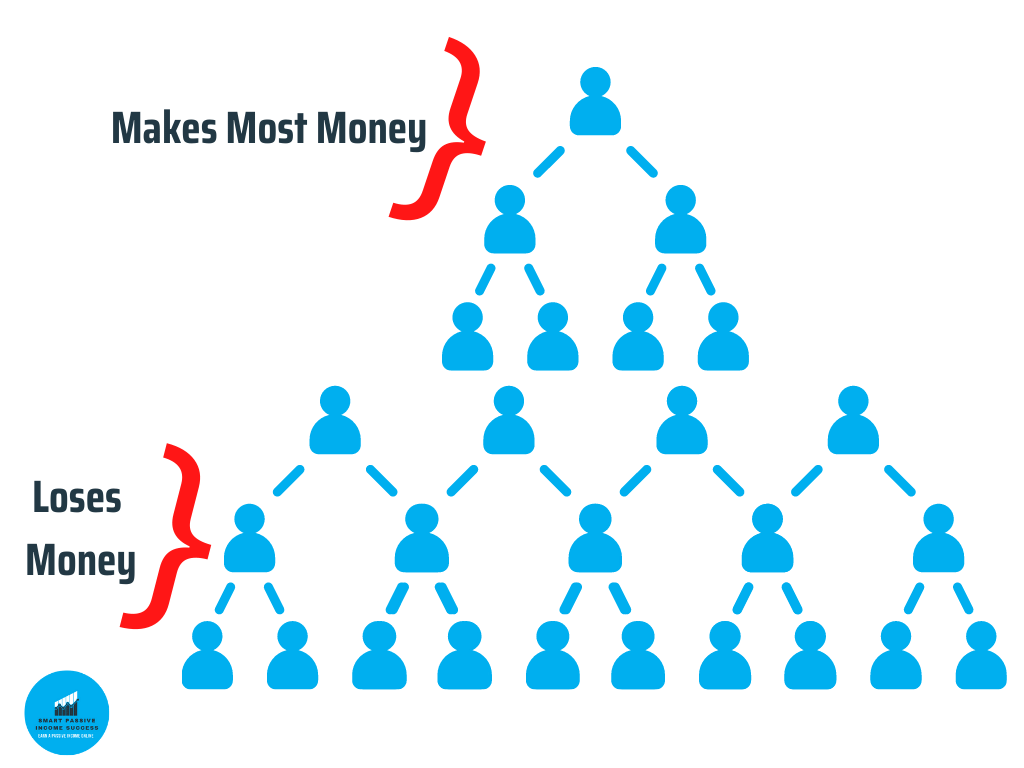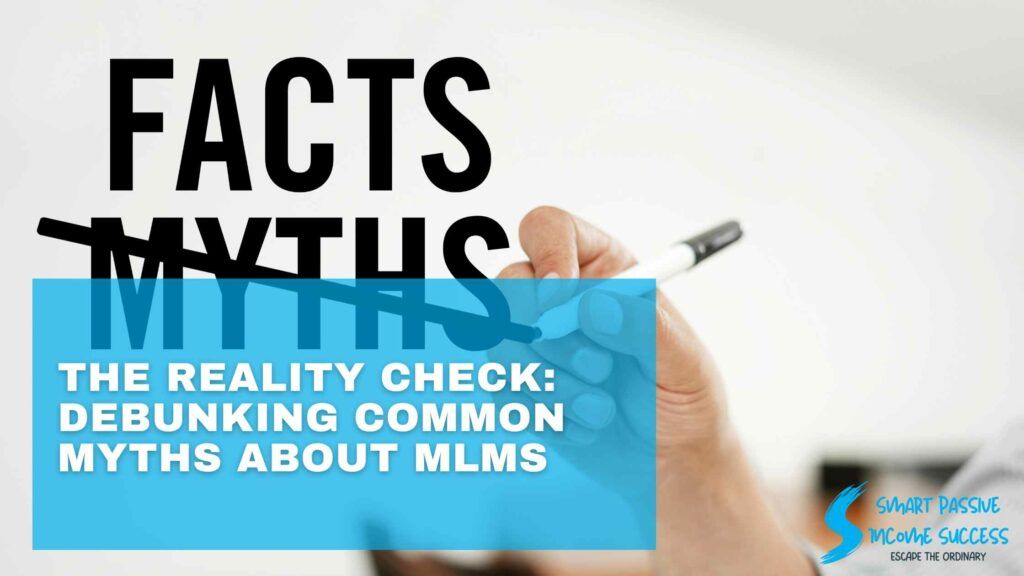Multi-level marketing (MLM) is a business model that many of us come across at some point. It relies on a network of distributors to sell products or services directly to consumers while also encouraging the recruitment of new sellers. With MLMs, your achievements can grow as you build your team and increase sales, earning a share of your recruits’ profits in the process.
However, this model has been surrounded by a swirl of scepticism and myths. People are quick to equate MLMs with get-rich-quick schemes or worse, illegal pyramid schemes. These myths can be persistent, but a deeper look reveals a complex landscape with both opportunities and pitfalls.
I’m here to clear the fog. By digging into the real facts, it becomes possible to separate legitimate business opportunities from misconceptions. The myths surrounding MLMs not only skew public perception but can also lead to poor decision-making for those contemplating MLM involvement.
With an informed mindset, let’s tackle one of the most pervasive myths right away. Do MLMs stand on the same shaky legal ground as pyramid schemes, or is there a clear line in the sand? Up next, we examine the distinctions and shed light on the legitimacy of MLMs versus the shadowy contours of pyramid schemes.
Table of Contents
Myth 1: MLMs Are Essentially Pyramid Schemes

A frequent misunderstanding about multi-level marketing is conflating it with illegal pyramid schemes. It’s essential to recognize the differences. While pyramid schemes prioritize recruitment over actual product sales, leading to inevitable collapse, MLMs are legal business models that focus on selling products or services.
Legal Guidelines and Consumer Protection
In MLMs, earnings are primarily from sales to end consumers, whether they’re part of the MLM or not. MLM participants can indeed earn commissions from new recruit sales, but this is secondary. MLMs operate under strict legal guidelines established by the Federal Trade Commission (FTC) in the United States and other regulatory authorities worldwide meant to protect participants and consumers.
Identifying Legitimate MLMs
What really solidifies the legitimacy of an MLM is its emphasis on tangible products or services. These offerings are meant to be competitive in the marketplace and provide value to the consumer, which pyramid schemes lack. The presence of a real, marketable product is a key legal litmus test.
To spot the red flags of a pyramid scheme, one must look for promises of high returns with little effort, emphasis on recruitment over sales, and elusive details about the product or service. Legitimate MLM companies will be transparent about earnings potential, product details, and the structure of their compensation plans.
Related Post: How to Choose the Right MLM For You
Myth 2: You Can Get Rich Quickly with MLMs
 I’ve heard the promises too: join an MLM and you’re on the fast track to unimaginable wealth. However, let’s set the record straight. The thought of making money quickly is enticing, but it’s rare in the realm of multi-level marketing. Like any business, MLMs require a firm commitment to work, extensive time investment, and astute market strategies for even a shot at significant earnings.
I’ve heard the promises too: join an MLM and you’re on the fast track to unimaginable wealth. However, let’s set the record straight. The thought of making money quickly is enticing, but it’s rare in the realm of multi-level marketing. Like any business, MLMs require a firm commitment to work, extensive time investment, and astute market strategies for even a shot at significant earnings.
The Reality of Earnings
Now, it’s not impossible for people to earn a good income through an MLM, but it is the exception rather than the rule. According to various reports and research studies, only a small percentage of MLM distributors achieve high-level incomes, and these are often the result of years of dedicated effort. For a clearer picture, the Federal Trade Commission found that less than 1% of MLM participants actually profit.
The Key to Success
The key takeaway is this: MLM is not a lottery ticket. It’s a business venture, demanding business acumen, sales skills, networking ability, and often, patience to grow your income over time. If you’re considering joining an MLM, ENTER WITH REALISTIC EXPECTATIONS and be prepared to put in considerable work before seeing any substantial financial return.
Related Post: Avoiding MLM Scams: Red Flags to Watch Out For
Myth 3: Most People Lose Money in MLMs
 I hear it often: the claim that most individuals who join MLMs end up with lighter wallets than when they started. But is there truth to this assertion, and what’s the full story?
I hear it often: the claim that most individuals who join MLMs end up with lighter wallets than when they started. But is there truth to this assertion, and what’s the full story?
Success Factors
To address this myth, let’s look at the available data. Not everyone turns a profit in MLM ventures, that’s a fact. However, this is true of many business ventures – success is never guaranteed. It’s vital to acknowledge the factors that can sway an MLM participant’s success, such as the level of commitment, business acumen, and the company’s structure.
Informed Decisions
The Federal Trade Commission provides insights into the MLM industry, highlighting that while some do incur losses, others enjoy modest earnings, and a few achieve significant financial success. It’s essential to enter into an MLM with clear expectations and an understanding of the business model.
The Importance of Education
Education is your ally here. Prospective MLM participants should arm themselves with knowledge by reviewing income disclosure statements, seeking advice from current and former participants, and assessing their own ability to sell the products or services offered.
To paint MLMs with a broad brush of financial doom does a disservice to the nuanced reality. The next section will shed light on the products themselves – a critical element often drowned out by the noise surrounding the financial aspects.
Related Post: The Pros and Cons of Joining an MLM
Turn Your Passion into Profits
Myth 4: MLMs Target Vulnerable Individuals
 It’s a claim I often hear: MLMs specifically prey on vulnerable individuals. The thought is that these companies look for those who are either desperate for income or easily influenced, in order to get them on board. I think it’s crucial to examine this myth with a clear lens and provide some perspective.
It’s a claim I often hear: MLMs specifically prey on vulnerable individuals. The thought is that these companies look for those who are either desperate for income or easily influenced, in order to get them on board. I think it’s crucial to examine this myth with a clear lens and provide some perspective.
When examining the demographics of those who join MLMs, it’s evident that participants come from various backgrounds. People of all ages, education levels, and economic statuses are represented. While it’s true that MLMs do promise potential financial benefits that might be appealing to someone experiencing economic hardship, the blanket statement that MLMs target such individuals is misleading.
Business Model Focus
It should also be recognised that MLM companies operate on a business model that is reliant on the recruitment of distributors, regardless of their socioeconomic status. The goal is to expand their sales force to enhance product distribution. There’s no evidence to suggest a systematic targeting of vulnerable populations as a universal practice within the industry.
Ethical Responsibility
However, this does not absolve all MLMs from ethical responsibility. Each company should be evaluated on its own merits, with a critical eye on its recruitment practices and the transparency of the opportunities it presents. When MLMs provide accurate information and realistic expectations about earnings and the level of commitment required, they contribute to an informed choice by potential recruits.
Ethics in Recruitment
Ethics in recruitment is crucial, and individuals should be wary of any company that does not provide clear information or that seems to pressure them into joining. In response to concerns about predatory practices, many legitimate MLMs have established support systems and training programs to assist their distributors. These initiatives aim to empower participants with the skills and knowledge necessary to make informed business decisions.
Related Post: Tips for Success in MLM Business
Myth 5: MLMs Use Aggressive and Unethical Recruitment Strategies
 It’s common to hear stories about MLM recruiters employing relentless and questionable tactics to grow their teams. However, it’s not right to paint every MLM with the same broad strokes.
It’s common to hear stories about MLM recruiters employing relentless and questionable tactics to grow their teams. However, it’s not right to paint every MLM with the same broad strokes.
Company Ethics and Methodologies
Each MLM company has its own code of ethics and recruitment methodologies. Many prioritize integrity and sustainable growth, providing training to ensure that their representatives approach recruitment respectfully and honestly.
Indicators of Ethical Practices
The transparency of the business model, the support offered to new recruits, and the emphasis on product sales over mere recruitment paint a very different picture from that of an aggressive strategy.
Evaluating Company Reputation
It’s crucial to recognize that while some individuals may overstep boundaries, this isn’t a reflection of the industry as a whole. MLMs that have stood the test of time operate on principles that respect individual choices and foster genuine connections.
I recommend anyone considering joining an MLM to look into the company’s reputation, recruitment practices, and the experiences of current and former participants. A respectful recruitment process is a strong indicator of a company’s commitment to ethical practices.
Related Post: Understanding the Compensation Plan in MLM
Turn Your Passion into Profits
Conclusion: Approaching MLMs With an Informed Perspective
 In closing, I’ve tackled some of the most stubborn myths surrounding multi-level marketing. The key takeaway isn’t that MLMs are flawless vehicles for success, but rather they are complex, like any business model, and merit a judicious, informed approach.
In closing, I’ve tackled some of the most stubborn myths surrounding multi-level marketing. The key takeaway isn’t that MLMs are flawless vehicles for success, but rather they are complex, like any business model, and merit a judicious, informed approach.
The Role of Critical Thinking
Critical thinking is your ally here. Before you sign on any dotted line, gather facts, scrutinize earnings disclosures, and consult with both current and former participants. There’s no substitute for due diligence. Understanding the nuanced reality of MLMs counters impulsive decisions based on misleading myths.
Weighing the Demands and Rewards
If MLM is a path you’re considering, weigh its demands against your skills, goals, and lifestyle. Success stories exist, but they’re built on more than luck or timing; they’re the result of hard work, solid strategies, and sometimes, yes, a bit of serendipity.
Transparency and Knowledge
Remember, reputable MLMs won’t shy away from tough questions or transparency. They’ll welcome scrutiny and provide clear, accessible information about their business practices.
When you’re armed with knowledge and a clear understanding of the risks and rewards, you’re positioned to make choices that align with your personal and financial well-being. And in the end, it’s not about proving myths right or wrong; it’s about empowering yourself to make informed decisions in the pursuit of any entrepreneurial endeavour.






